Proknow Chapter 5 Submarines
1/63
There's no tags or description
Looks like no tags are added yet.
Name | Mastery | Learn | Test | Matching | Spaced |
|---|
No study sessions yet.
64 Terms
Mission of the Submarine force
to execute the mission of the U.S. Navy in and from the undersea domain.
accomplished in peacetime, a time of tension, or during conflict."
Submarine Warfare insignia
bow view of a submarine, proceeding on the surface, with bow planes rigged for diving, and dolphin fish flanking the bow and conning tower of a submarine
"Dolphins of Fish"
Officers gold, enlisted silver
Adopted in 1924
SSBN Deterrent Patrol Pin
sailors of the submarine service who have completed strategic deterrent patrols on nuclear ballistic missile submarines.
silver Lafayette-Class submarine with superimposed Polaris missile and electron rings
SSBN Deterrent Patrol Pin
SSBN Deterrent Patrol Pin
holds up to six award stars, with one gold star authorized for each successful deterrent patrol, or a silver star for five successful deterrent patrols. At twenty (20) successful patrols, the SSBN pin is upgraded to a gold design.
SSBN Deterrent Patrol Pin
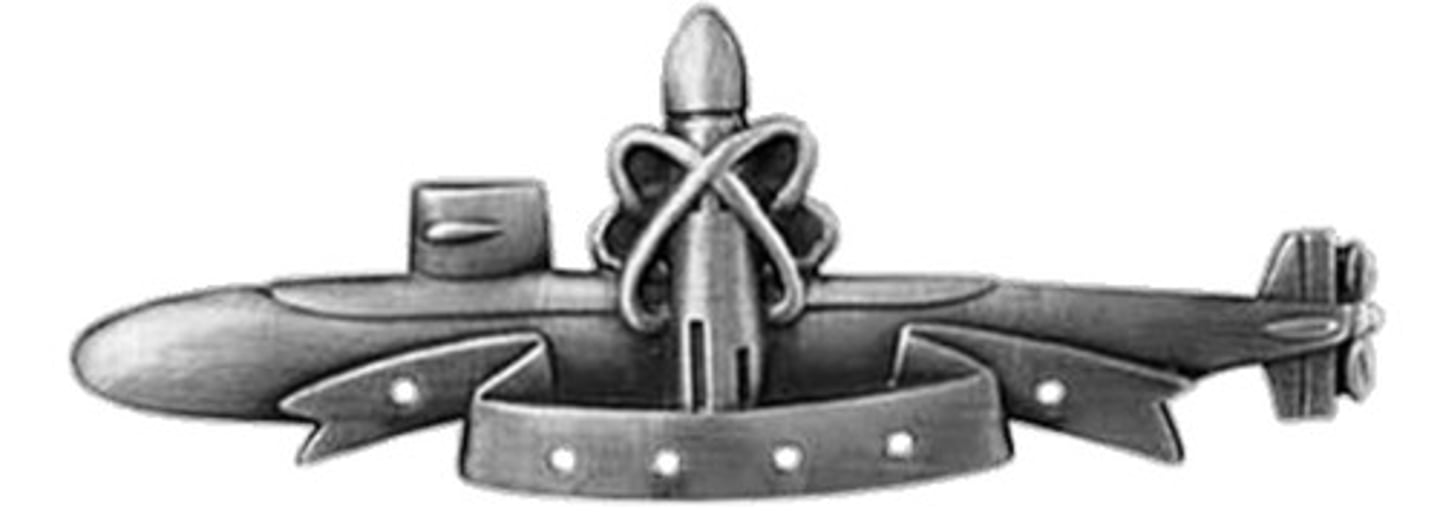
Submarine Combat Patrol Pin
Gato-Class
diesel submarine. one gold star for each successful patrol after the first or a silver star for five successful patrols.

officers and enlisted who have completed combat patrols during declared wars, the last of which conducted during World War II.
Submarine Combat Patrol Pin
April 11th 1900
Submarine Birthday
American Revolution
The first military submarine was the American-built Turtle (1775)
hand-powered, egg-shaped device accommodated a single man.
attempted
to sink a British warship, HMS Eagle moored in New York harbor
Civil War
the H.L. Hunley, performed the first successful military submarine mission when she sank the USS Housatonic off Charleston Harbor.
following the engagement and her entire eight-man crew perished
Pre-World War era
USS Holland (SS-1) was the United States Navy's first modern commissioned submarine. launched in 1897. She was acquired by the USN on 11 April 1900
WWI
The fleet of American diesel submarines was used primarily for coastal
defense. However, after 1917, some American boats drew assignments to European waters.
WWII
The U.S. submarine fleet employed the Gato, Balao, and Tench classes
destroyed 1,314 enemy ships totaling 5.3 million tons (including 8 aircraft carriers and more than 200 warships). Translated - 55% of all enemy ships sunk were by approximately 6% of the Naval force.
lost 375 officers and 3,131 enlisted men in fifty-two submarines, the highest casualty rate of any U.S. service branch in WWII. Additionally, seven submarine Commanding Officers, all USNA graduates, were awarded the Medal of Honor for their actions
Cold War
improvements included:
(1) The tear-dropped hull shape,
(2) Nuclear powered propulsion
January 17, 1955
Commanding Officer Eugene Wilkinson spoke the famous words "underway on nuclear power" to launch the first nuclear powered submarine, USS Nautilus (SSN-571)
limited only by their capacity to store food.
Father of the nuclear navy
Hyman Rickover
1960's
strategic planners divided the submarine force into two distinct components, ballistic missile (SSBN) submarines and fast attack (SSN) submarines.
Sail
The vertical section on the submarine where the bridge is located.
Fairwater plane
The "horizontal wings" located on the sail of the submarine.
Bow Plane
The "horizontal wings" located on the bow of the submarine.
Fast Attack Submarine
1) seek and destroy enemy submarines (ASW) and surface ships (ASUW);
(2) conduct precision strikes with Tomahawk cruise missiles (STRIKE);
(3) deliver and support Special Operation Forces (SOF);
(4) carry out Intelligence, Surveillance, and Reconnaissance (ISR) missions;
(5) support Carrier Strike Groups;
(6) engage in mine warfare.
Fast Attack Submarine
Los Angeles
Seawolf
Virginia
Consists of 15 officers and 120 enlisted
West Coast SSN's
home-ported in Pearl Harbor, HI; San Diego, CA; Bremerton, WA; and Guam.
East Coast SSN's
home-ported in Groton, CT, and Norfolk, VA.
Ballistic Missile submarines
Ohio Class, use two crews ('Blue' and 'Gold' crews) which alternate on-patrol.
capability to carry up to 24 submarine-launched ballistic missiles (SLBMs)
As of February 2018, the new Strategic Arms Treaty (START) is in effect, making the SSBN force responsible for 70% of the United States strategic weapons inventory.
Most survivable and capable nuclear strike capability.
West Coast Boomers
home-ported in Bangor, WA
East Coast Boomers
home-ported in King's Bay,
GA.
Future Projects
Columbia Class submarine is being designed to replace the Ohio Class ballistic missile submarine. decommissioned, one per year, beginning in 2027.
include X-shaped stern control surfaces (hydroplanes), sail-mounted dive planes, and electric drive.
Mk-48 and Mk-48/ADCAP (ADvanced CAPability) Torpedoes
torpedo is designed to detonate underneath a ship, creating a steam void below the ship that breaks the ship's keel.
Trident II (D5) Submarine Launched Ballistic Missile (SLBM)
deployed in Ohio Class SSBN submarines, each carrying up to 24 missiles.
three-stage, solid-propellant ballistic missile with a range of more than 4,000 nautical miles.
Trident II (D5) Submarine Launched Ballistic Missile (SLBM):
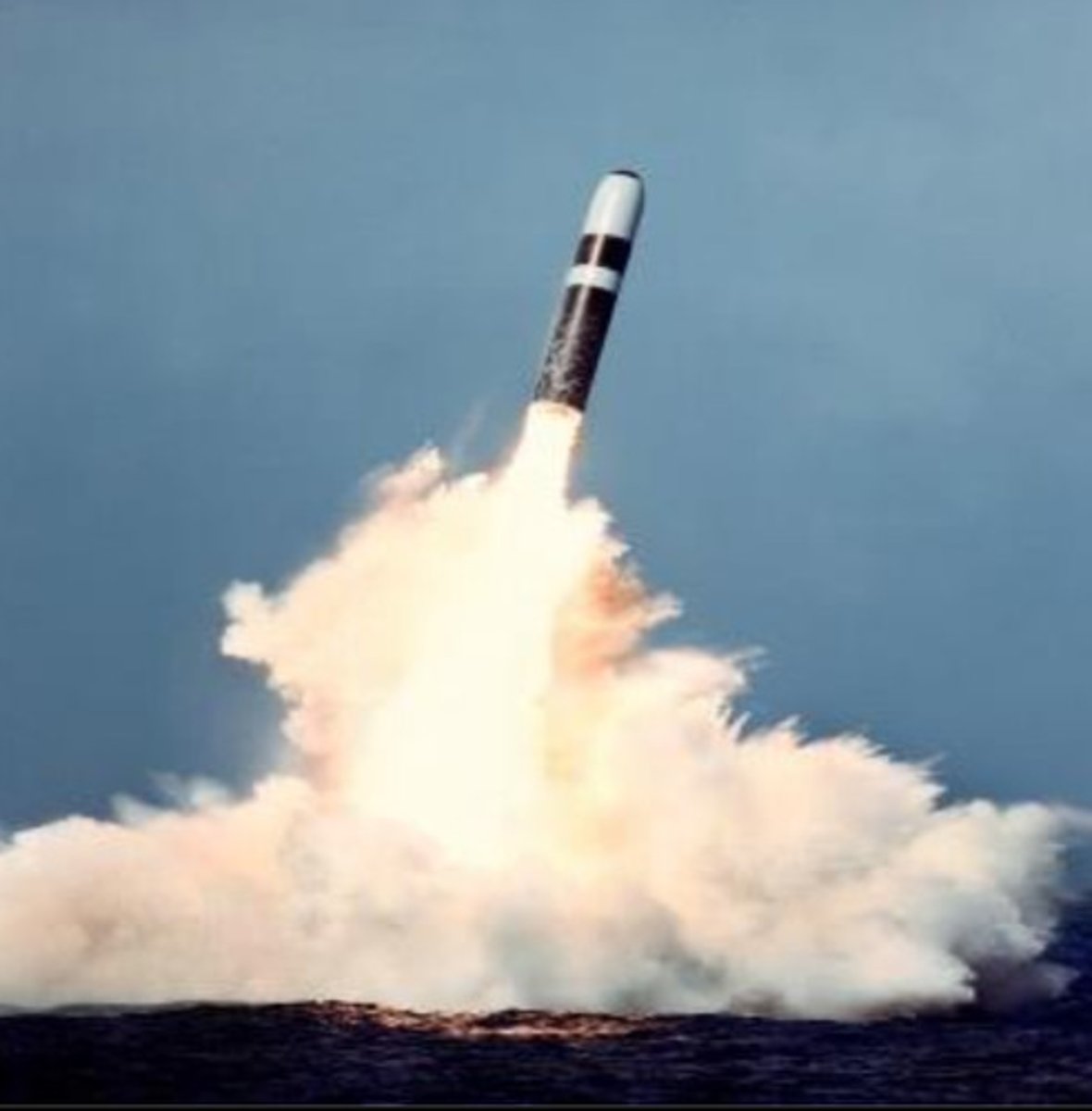
Tomahawk Cruise Missile Launch from SSGN
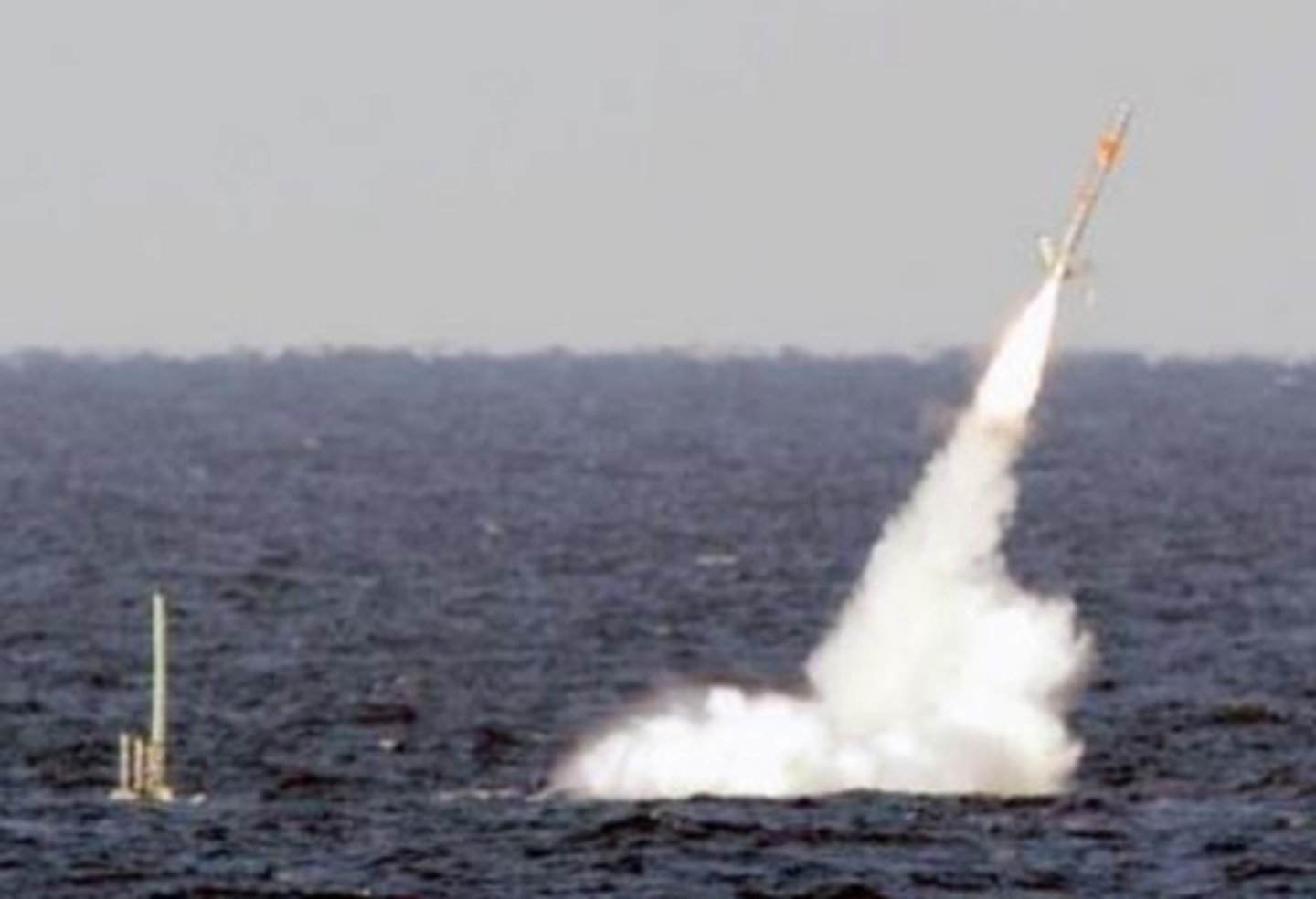
Mk-48 and Mk-48/ADCAP (ADvanced CAPability) Torpedoes
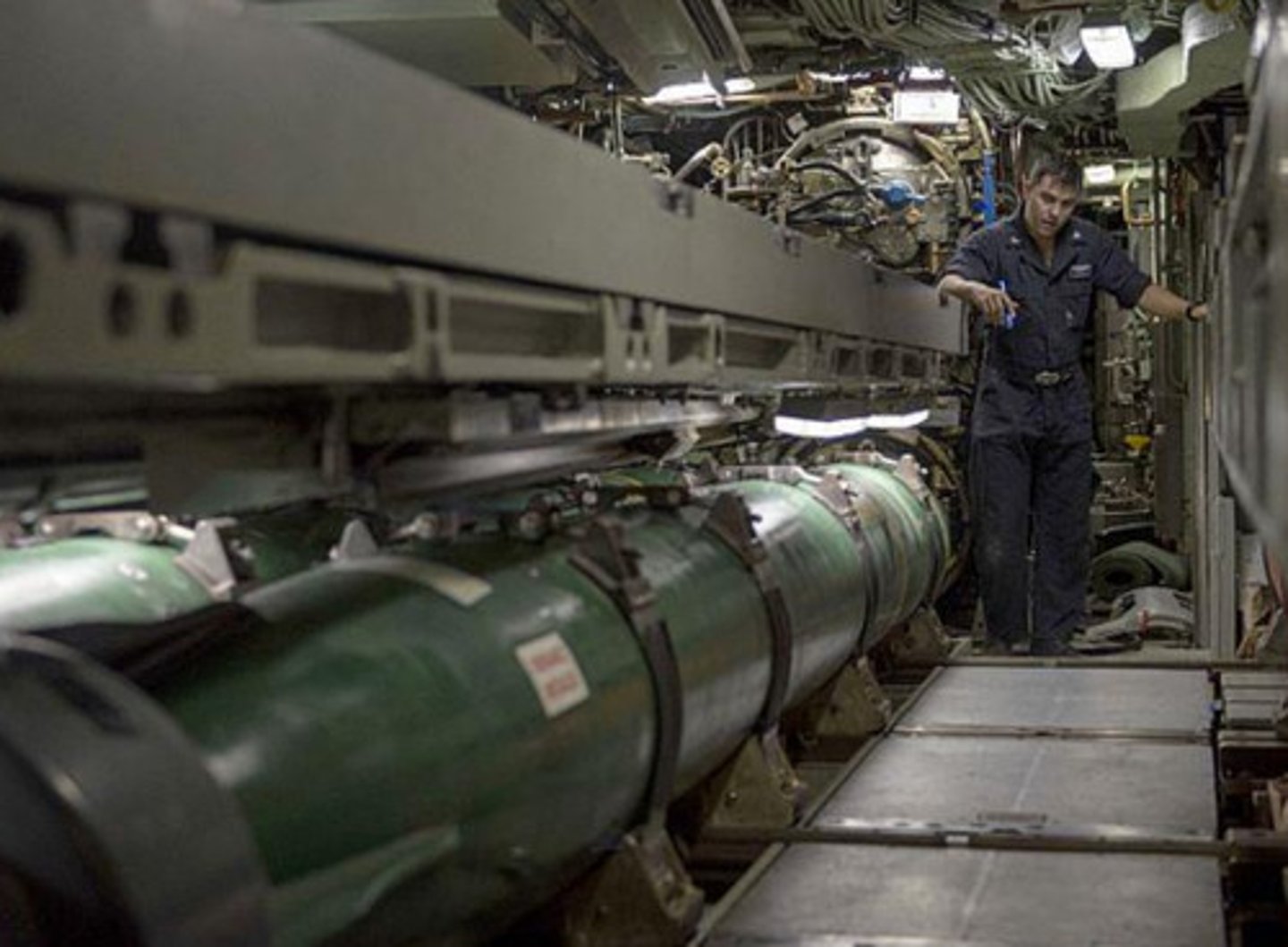
SONAR sensors:
Spherical Array (in the bow)
Hull Array (along the hull)
Towed Array (out the stern)
High Frequency Array (in the sail)
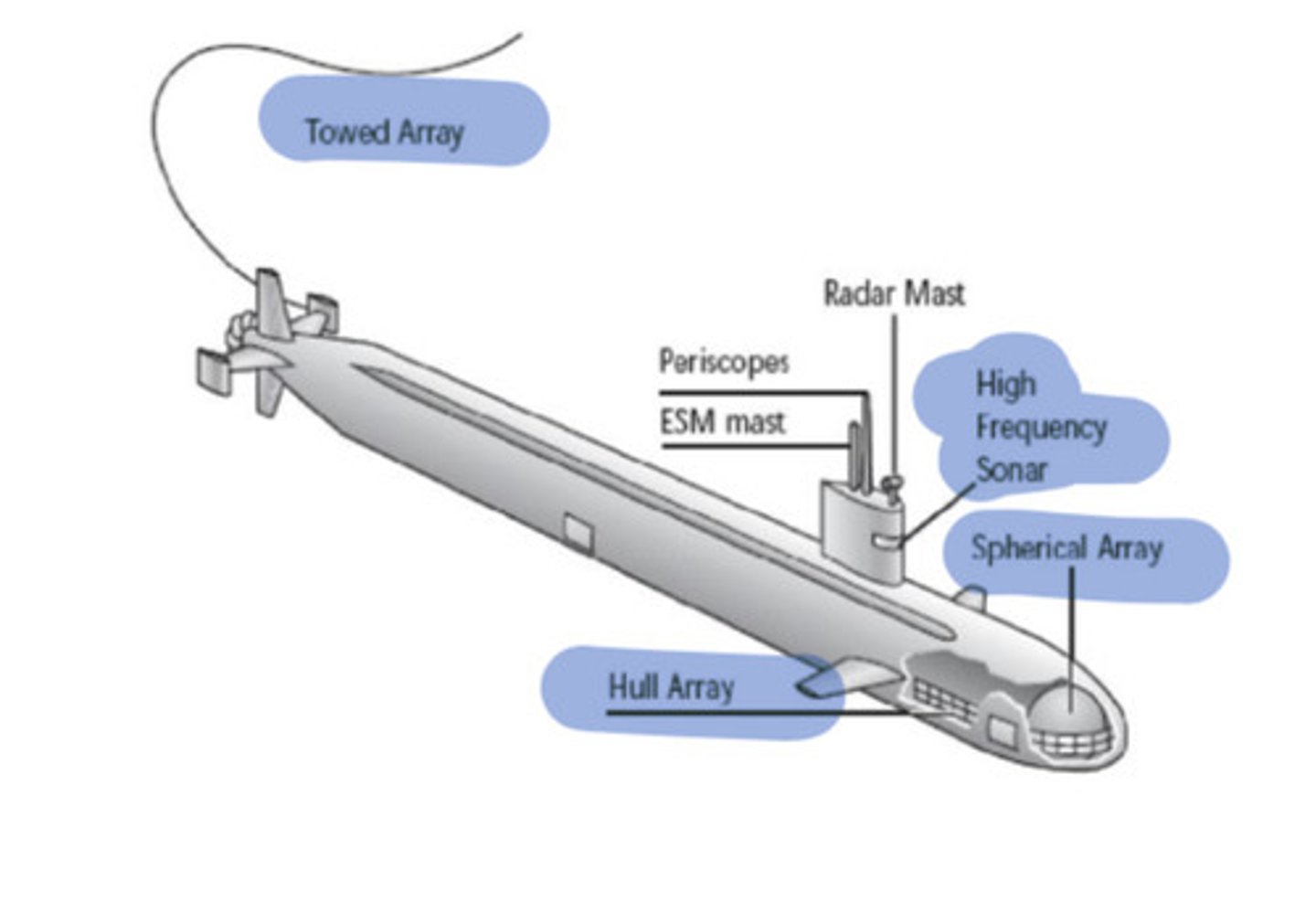
Periscopes and Photonics Masts
used to see outside the submarine for safety and targeting other vessels, uses include but are not limited to visual detection of other ships and aircraft, ranging, infrared and low-level light detection, communications, and electromagnetic spectrum monitoring.
Periscopes and Photonics Masts

Dry Dock Shelters (DDS)
give submarines greater ability to deploy special operations forces (SOFs) by transporting, deploying and recovering forces via the DDS.
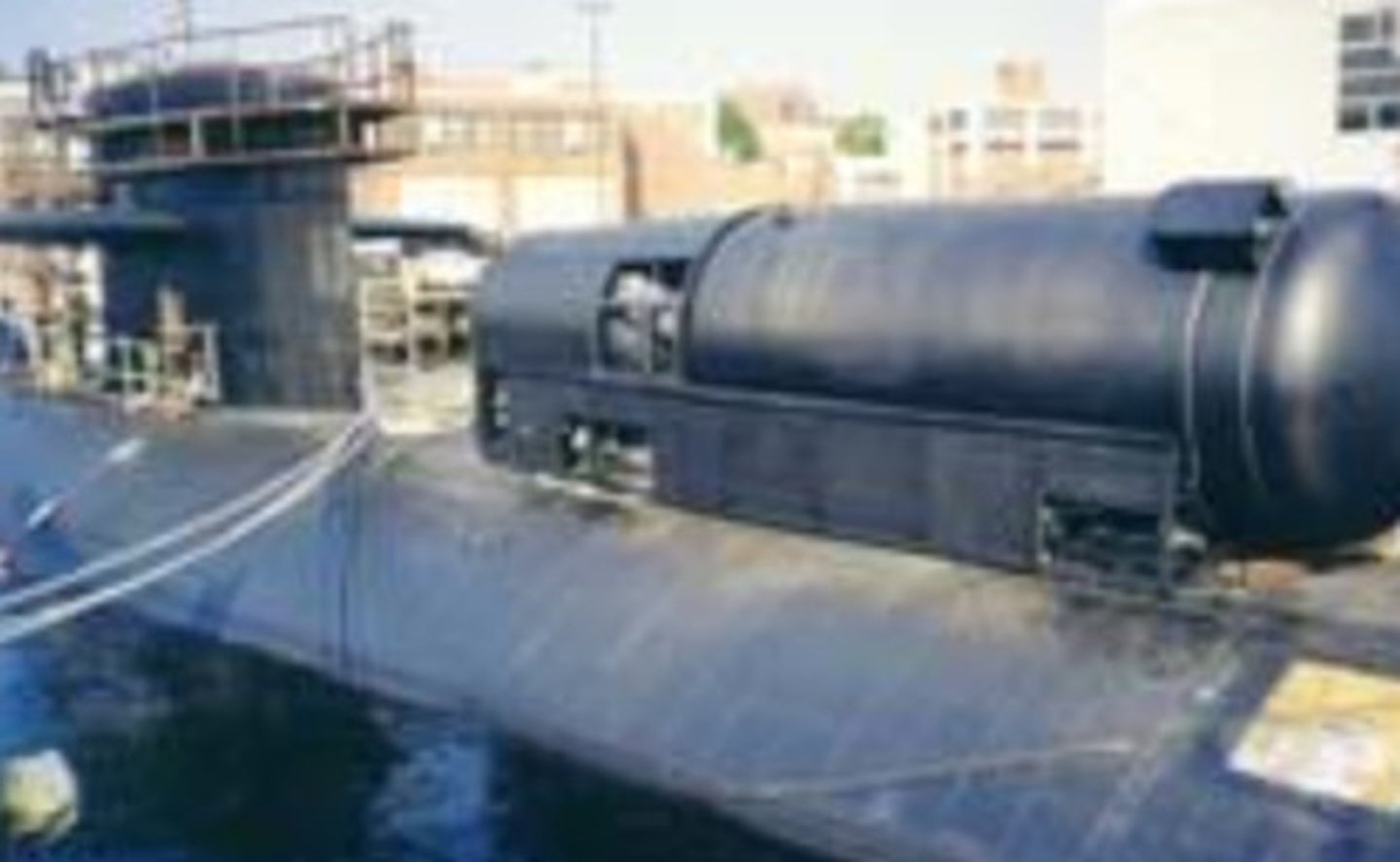
Guided Missile Submarines (SSGN)
first four of the Ohio Class SSBNs were converted into guided missile submarines (SSGN). provide the Navy with a combination of precision strike and Special Operation mission capability within a stealthy, clandestine platform.
Carry's an entire carrier strike groups cruise missile capability.
West Coast SSGNs
home-ported in Bangor, WA and typically swap crews in Guam.
East Coast SSGNs
home-ported in King's Bay, GA and typically swap crews in Diego Garcia.
Missions of SSGNs
Intelligence, Surveillance, Reconnaissance (ISR)
Naval Special Warfare (NSW)
Strike
Anti-Submarine Warfare (ASW) and Anti-Surface Warfare (ASUW):
Mine Warfare:
Counter-Drug Operations:
Missions of SSNs
Intelligence, Surveillance, Reconnaissance (ISR)
Strike
Anti-Submarine Warfare (ASW) and Anti-Surface Warfare (ASUW):
Mine Warfare:
Counter-Drug Operations:
Missions of SSBNs
Strategic Deterrence:
Intelligence, Surveillance, Reconnaissance (ISR):
Observe and record video of other countries' military exercises (etc.), relying on our stealth capabilities. Intercept communications to provide cueing to our forces. (SSN/SSGN)
Naval Special Warfare (NSW):
DDS capabilities to insert SEALs near another country's shore, allowing them easy access to and extraction from enemy territory with maximum stealth. (SSGN)
Strike
Launch Tomahawk cruise missiles into enemy territory with no warning, while operating submerged and undetected. (SSN/SSGN)
Anti-Submarine Warfare (ASW) and Anti-Surface Warfare (ASUW):
(ASW) Track other countries' submarines to get info regarding their operating patterns and acoustic information that we could use if we ever went to war. Capable of launching Mk-48 Advanced Capability torpedoes if needed to attack an enemy submarine. (ASUW) Track other countries' surface ships to get info about their operating patterns and discover vulnerabilities to counter-detect these platforms. (SSN/SSGN)
Mine Warfare:
Able to detect, avoid, and neutralize enemy mines, allowing us to counter-act Anti-Access/Area-Denial capabilities. Against countries who may try to close off choke points critical to maritime commerce or their own security. (SSN/SSGN)
Counter-Drug Operations:
Detect drug-running boats and submarines, then inform law enforcement. (SSN/SSGN)
Strategic Deterrence:
Remain undetected as a capable delivery vehicle of nuclear warheads to hostile nations. SSBNs make up the survivable leg of the nuclear triad (bombers, missile silos, submarines) as they operate undetected in the world's oceans. Nuclear deterrence theory suggests that the only defense against a nuclear attack from a nation-state is a retaliatory nuclear strike resulting in mutual destruction. (SSBN)
SSNs and SSGNs
SSNs typically operate on 6 month deployments, and SSGNs have 15 month deployments. Like SSBNs, SSGNs will have two crews which are able to swap out in theater
SSBNs
Ohio-class design allows the submarines to operate for 15 or more years between major overhauls. On average, the submarines spend 77 days at sea followed by 35 days in-port for maintenance.
Los Angeles Class Fast Attack Submarines. Left to Right - 688 (I/II), and 688I (III)

Seawolf Class Fast Attack Submarine (USS Seawolf (SSN 21) & USS Jimmy Carter (SSN 23))

Virginia Class Fast Attack Submarine [USS Virginia (SSN 774) & USS North Dakota (SSN 784)]
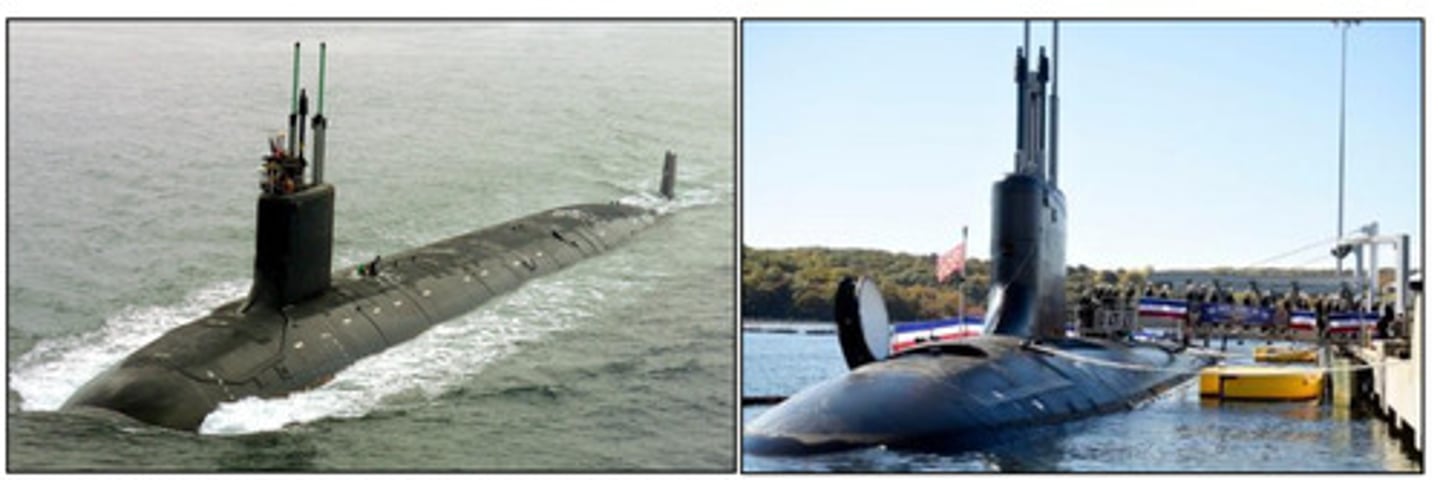
Ohio Class Ballistic Missile Submarine [USS Maine (SSBN 741)]

Ohio Class Guided Missile Submarine. [USS Ohio (SSGN 726)]

SSN-688 and 688I Los Angeles class Attack Submarines (SSN 688 -- SSN 773)
VID: Length: 362ft; Beam: 33ft; Draft: 31ft
Flight I have fairwater planes.
Flight II have fairwater planes and 12 Vertical Launch Tubes (VLS) in the bow.
Flight III have bow planes and 12 VLS tubes in the bow. Sails are unfaired at the leading edge.
Weapons: 4 Torpedo Tubes - for MK 48 ADCAP Torpedoes or UGM-109 Tomahawk Cruise Missiles
Test depth: 800+ft; Speed: 20+knots submerged, 14+knots surfaced
Notes: USS Los Angeles (SSN-688) commissioned in 1976.
Decommissioned at two per year, and replaced by the new Virginia Class SSNs.
SSN-21 Seawolf Class Attack Submarine (SSN 21 -- SSN 23)
Visual Identification Broader beam and slightly shorter than Los Angeles Class submarines. The sails are faired at the leading edge and are fitted with bow planes.
Weapons 8 Torpedo Tubes - for MK 48 ADCAP Torpedoes or UGM-109 Tomahawk Cruise Missiles
Notes: USS Seawolf (SSN 21) commissioned in 1997.
USS Jimmy Carter (SSN-23) has a 100-foot hull extension called the "Multi-mission Platform"
SSN-774 Virginia Class Attack Submarine (SSN 774 -- SSN 821 and beyond)
Visual Identification: Longer than Los Angeles Class.
The sails are faired at the leading edge and are fitted with bow planes and VLS.
Weapons: 4 Torpedo Tubes - for MK 48 ADCAP Torpedoes or UGM-109 Tomahawk Cruise Missiles
Capability: Test depth: 800+ft; Speed: 25+knots submerged
Notes: USS Virginia (SSN 774) was commissioned on 2004.
Block V have the Virginia Payload Tubes (VPT) which will provide additional guided-
missile capability and replace the SSGNs.
SSN-774 Virginia Class Attack Submarine (SSN 774 -- SSN 821 and beyond)
Enhanced Capability: (1) a fly-by-wire ship control system that provides improved shallow-water ship handling;
(2) enhanced special operation forces support systems;
(3) a reconfigurable torpedo room, which can house either a combination of torpedoes and Tomahawk cruise missiles, or a large number of Special Operation Forces (SOF);
(4) a large lock-in/lock-out chamber for divers;
(5) two Photonics Masts that contain color, high-resolution black and white, and infrared digital cameras;
(6) modular construction, open architecture, and commercial off-the-shelf components
SSBN-726 Ohio Class Ballistic Missile Submarine (SSBN 726 - SSBN 743)
Visual Identification: Length: 560ft; Beam: 42ft; Draft: 35ft
Fairwater planes.
Large "turtleback" hull design
Weapons: 24 Trident II D5 SLBM Tubes
4 Torpedo Tubes - MK 48 Torpedoes
Capability: Test depth: 800+ft; Speed: 20+knots submerged
SSGN-726 Ohio Class Guided Missile Submarine
Visual Identification: Fairwater planes otherwise known as sail planes
Large "turtleback" hull design
Deck stays dry while riding on the surface
Weapons: 4 Torpedo Tubes - MK 48 Torpedoes
22 of 24 Missile Tubes x7 UGM-109 Tomahawk Cruise Missiles per tube -- Maximum 154
Enhanced Capability: Berth for a team of 66 SOF personnel for up to 90 days.
Ability to carry the Dry Deck Shelter/SEAL Delivery Vehicle (DDS/SDV).
Ability to launch Unmanned Aerial Vehicles (UAVs) or Unmanned Underwater Vehicles
(UUVs).